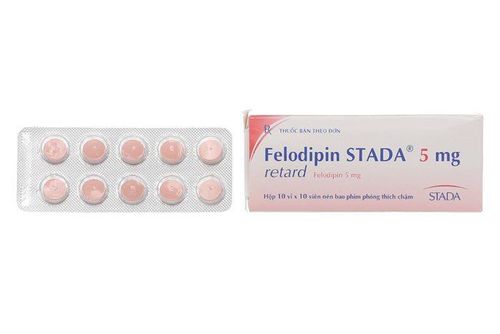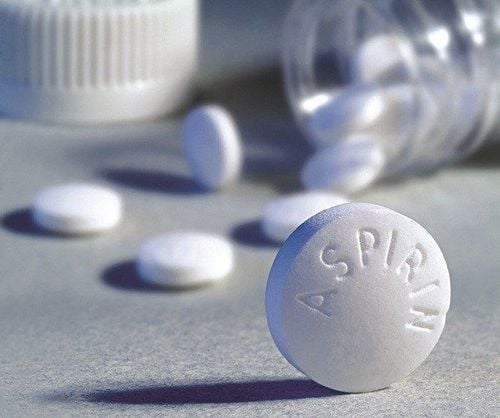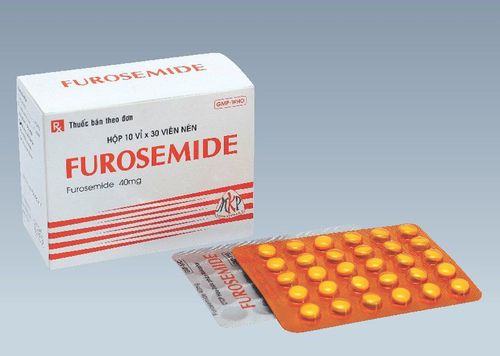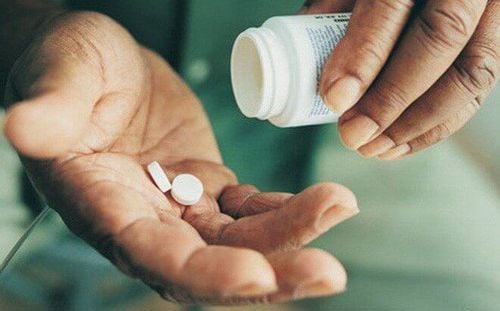This is an automatically translated article.
If high-dose aspirin is used to relieve pain, low-dose aspirin is a treatment for preventing heart attacks and strokes in people at high risk such as having had heart surgery or having had angina due to heart disease. So how best to use low-dose aspirin to prevent heart attacks?
1. How does low-dose aspirin prevent a heart attack?
Usually, to prevent a heart attack, your doctor will prescribe a low-dose aspirin equivalent to a once-daily dose, 75mg/time. To avoid stomach upset, it is best not to take it on an empty stomach, but to take low-dose aspirin immediately during or immediately after a meal.
Low-dose aspirin comes in many different dosage forms. With low-dose aspirin in soluble tablet form, dissolve the medication in a glass of water. As for the standard tablet form or enteric coated tablets, you should swallow the tablet whole with water. Be careful not to chew or crush low-dose aspirin in enteric-coated tablet form because it will damage the enteric coating that helps reduce stomach irritation.
2. Side effects of low-dose aspirin
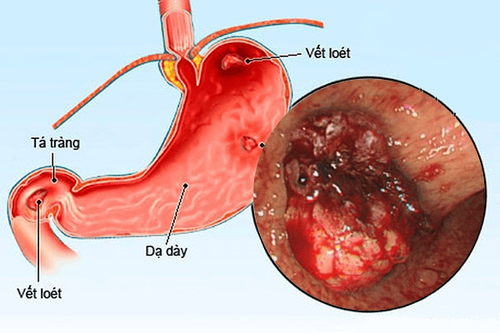
Khi dùng thuốc aspirin nhưng tình trạng khó tiêu vẫn không biến mất có thể bị loét dạ dày
Like all medicines, low-dose aspirin can also cause unwanted effects. Both low and high doses of aspirin can cause indigestion. To avoid this, take low-dose aspirin with food. If indigestion still doesn't go away, it could be a sign that aspirin has caused a stomach ulcer. Therefore, talk to your doctor to determine the problem and possibly supplement with anti-ulcer medication if necessary.
One side effect of aspirin to be aware of is that it bleeds easily, leading to nosebleeds, easy bruising, and harder to stop bleeding than usual. To be on the safe side, be careful to avoid injuries that lead to bleeding. It is best to stop playing contact sports such as football, rugby, and hockey while taking low-dose aspirin.
Serious side effects from low-dose aspirin are rare but most are very dangerous. Call your doctor right away if, after taking aspirin, you notice red, blistering, and peeling skin; coughing up blood or blood in your urine, stools, or vomiting; yellowing of the skin or eyes (have liver problems); pain in the joints of the hands and feet (a sign of high blood uric acid levels); swollen hands or feet (possibly a sign of increased fluid retention causing edema).
Also, in rare cases, low-dose aspirin can cause a serious allergic reaction such as anaphylaxis.
3. What precautions when using low-dose aspirin to prevent heart attack?

Hội chứng reye ở trẻ em khi dùng aspirin
Most people over the age of 16 can use aspirin. However, this does not mean that low-dose aspirin is safe for everyone. Therefore, you should only take low-dose aspirin if your doctor recommends it, and with these important points in mind.
3.1 Who should be cautious when using low-dose aspirin Some situations that need to be considered carefully before deciding to use low-dose aspirin to prevent heart attack include patients allergic to aspirin or similar pain relievers. similar to ibuprofen, with a history of stomach ulcers, high blood pressure, indigestion, heavy menstrual bleeding, recent stroke. In addition, people with lung disease, a history of blood clotting problems, liver and kidney problems, gout or asthma patients who use aspirin should be very careful.
3.2 Use of low-dose aspirin to prevent heart attacks in children under 16 Never give aspirin to a child younger than 16, unless prescribed by a doctor. The reason is, there is a link between aspirin use and Reye's syndrome in children. Reye's syndrome is a very rare disease that can cause severe liver and brain damage.
MORE: Reye's syndrome in children when taking aspirin
3.3 Use of low-dose aspirin for pregnant and lactating women If you are or plan to become pregnant or breast-feeding, your doctor may advise you to take low-dose aspirin during pregnancy to help prevent heart attack and stroke, prevent preeclampsia (high blood pressure associated with pregnancy), or if you're on fertility treatment or have had several miscarriages previous times.
MORE: Should aspirin be used during pregnancy?

Phụ nữ mang thai có thể được bác sĩ khuyên bạn dùng aspirin liều thấp để đề phòng tiền sản giật
3.4 Drugs that interfere with low-dose aspirin's heart attack-preventing action Tell your doctor if you are taking antiplatelet drugs, anti-inflammatory pain relievers such as ibuprofen, medications to prevent organ rejection after transplant, high blood pressure medicine, digoxin, lithium, acetazolamide, methotrexate, insulin, and gliclazide before starting aspirin to prevent a heart attack because the drugs interfere with aspirin's action.
3.5 What to do if you miss a dose or overdose on low-dose aspirin If you miss a dose of low-dose aspirin, take it as soon as you remember. In case you do not remember until the next day, skip the missed dose and take the next dose.
Taking 1 or 2 more aspirin pills is unlikely to cause harm. However, if you've taken too much aspirin and feel nauseous, have ringing in your ears, or have other problems with hearing, confusion, or dizziness, go to the emergency department and bring your packet of aspirin and your leaflet with you. medication that you are taking to be treated promptly.
Heart attack and stroke are both dangerous medical conditions and need to be monitored, controlled and treated promptly. In some cases, the doctor may prescribe the patient to use low-dose aspirin for treatment. In order to avoid unwanted cases, in addition to following the instructions of the doctor, patients need to combine with nutrition and exercise to control the disease effectively. Besides, early screening for stroke is extremely important and necessary so that doctors can come up with an appropriate treatment plan.
Currently, Magnetic Resonance Imaging - MRI/MRA is considered a "golden" tool for brain stroke screening. MRI is used to check the condition of most organs in the body, especially valuable in detailed imaging of the brain or spinal nerves. Due to the good resolution and contrast, MRI images allow to detect abnormalities hidden behind bone layers that are difficult to detect with other imaging methods. MRI can give more accurate results than X-ray techniques (except DSA angiography) in diagnosing brain diseases, cardiovascular diseases, strokes,... Moreover, the process MRI scans do not cause the side effects seen in X-rays or computed tomography (CT).
Vinmec International General Hospital currently owns a 3.0 Tesla MRI System, which is equipped with state-of-the-art equipment by GE Healthcare (USA) with high image quality, allowing a comprehensive assessment, without omitting the injury without leaving any damage. and reduce shooting time. Silent technology helps to reduce noise, create comfort and reduce stress for the client during the shooting process, resulting in better image quality and shorter imaging time. With the state-of-the-art MRI system With the application of modern methods of cerebral vascular intervention, a team of experienced and well-trained neurologists and imaging specialists, Vinmec is a prestigious address for stroke risk screening and screening. reliable goods.
In the past time; Vinmec has successfully treated many cases of stroke in a timely manner, leaving no sequelae: saving the life of a patient suffering from 2 consecutive strokes; Responding to foreign female tourists to escape the "death door" of a stroke ;...
Please dial HOTLINE for more information or register for an appointment HERE. Download MyVinmec app to make appointments faster and to manage your bookings easily.
Reference sources: nhs.uk, health.harvard.edu



